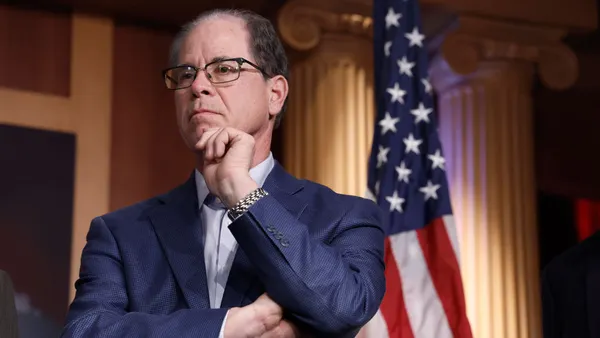Dive Brief:
- Saying Obama-era credit hour definitions "only created barriers to innovation for students and institutions," House Education and the Workforce Committee Chair Virginia Foxx (R-NC) is leading the push to scrap the definitions with the new PROSPER Act to re-authorize the Higher Education Act.
- Critics of this proposal worry the change will lead "bad actors" to shuffle more students along at a quicker pace, taking advantage of financial aid dollars while leaving students with little learned, according to The Hill. One audit, for example, found an institution had allowed a student to accumulate nine credit hours in one 10-week online course.
- The act also would soften the requirement that any online program obtain authorization from each state in which it operates and collects federal financial aid.
Dive Insight:
Many anticipated a softer regulatory climate for for-profits — and higher ed in general — with the election of Donald Trump and a Republican-majority 115th Congress. And while concerns about consumer protections may be legitimate, equally legitimate are concerns that some definitions may hinder innovation, even as higher ed leaders are being urged to innovate.
Increasing career and technical education programs is a huge priority for the GOP, as evidenced by the focus on CTE and apprenticeship programs in the new legislation, as well as in the voiced perspectives that higher education should exist primarily as a workforce development vehicle — particularly if it is to be publicly funded. Still, some maintain that definitions around credit hours and curricula should happen with accreditors, not with Congress, though there is consensus that the way institutions are accredited should be re-considered. For example, instead of regional accreditors, the Committee for Economic Development and other higher ed organizations believe, the governing bodies should oversee schools with like profiles.
"Right now, small liberal arts universities are reviewed by the same entities that evaluate the major research institutions, and they're totally different business models," said Monica Herk, CED's vice president of education research.
For traditional institutions, however, there is a lot of opportunity to begin or further conversations which should be already happening on campus. Conversations like how to unbundle degrees to better serve adult and continuing learners and how to "blow up the box," in the words of the iconic Gordon Gee, will help the industry move ahead and better serve today's students regardless of whether it's addressed in the legislation. And strengthening ties to local industry and even the K-12 system will not only promote stronger value and a better product by increasing the weight of degrees, it will also help to quiet some of the negative chatter around whether higher ed is even still relevant.












